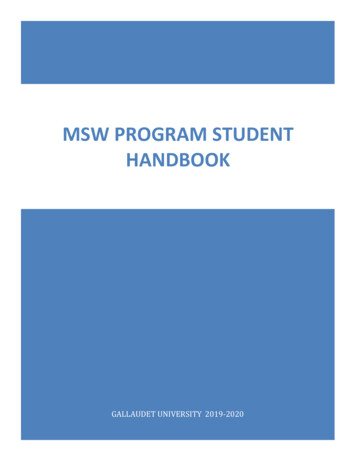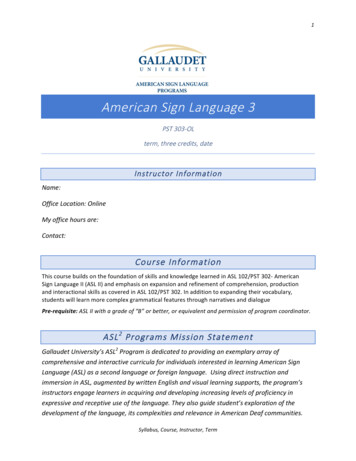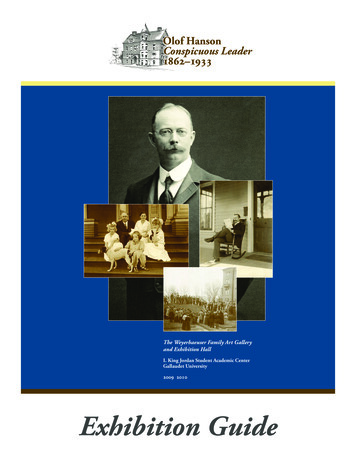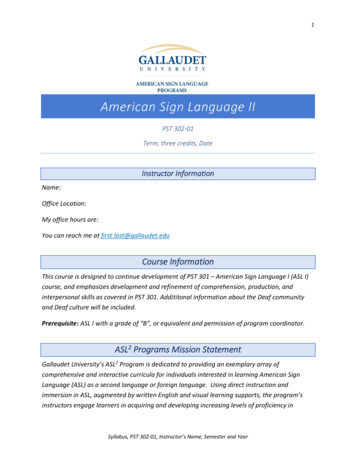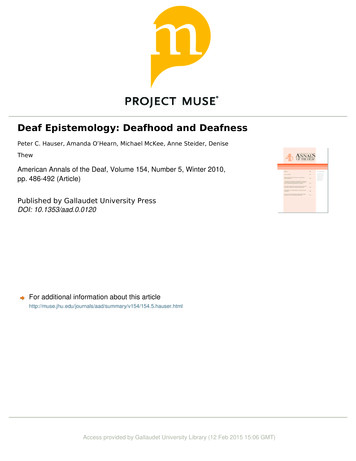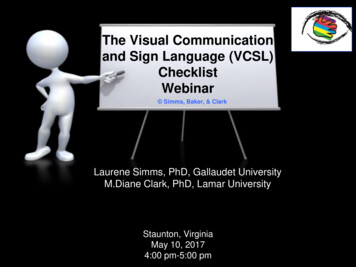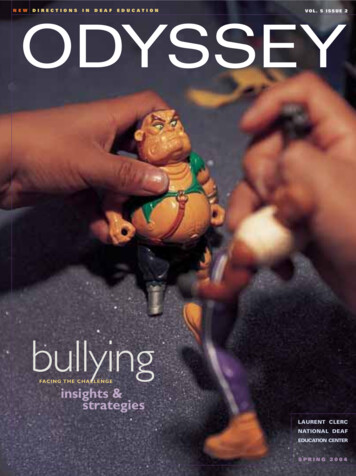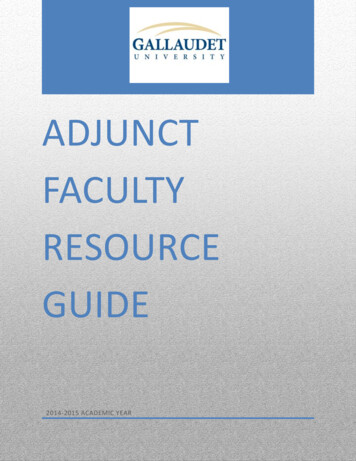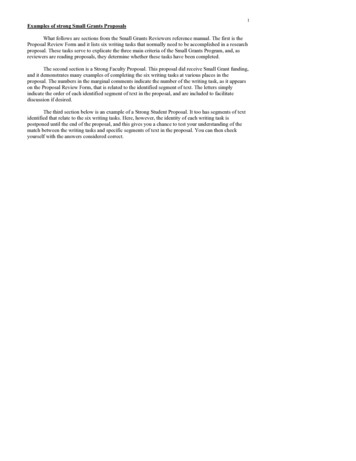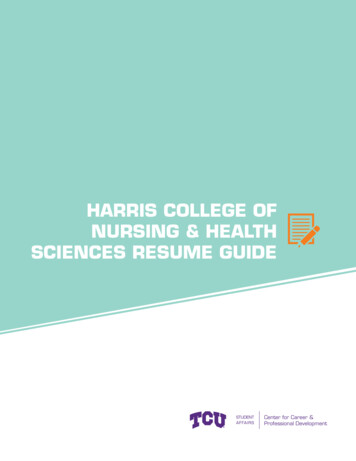
Transcription
Linda Risser Lytle,PhD, professor in theDepartment ofCounseling at GallaudetUniversity, is director ofthe Summers & OnlineSchool CounselingProgram, which issupported by a traininggrant from the UnitedStates Office of SpecialEducation Programs, andco-director of the Deafand Hard of HearingInfants, Toddlers andtheir Families: Leadershipand CollaborationInterdisciplinary GraduateCertificate Program atGallaudet University.Lytle is a licensedpsychologist andmaintains a privatepractice in Washington,D.C.Cheryl L. Wu, PsyD,is director of the schoolcounseling program andprofessor at GallaudetUniversity inWashington, D.C. She isalso the co-founder ofCultural Intersections inOakland, California, anonprofit communitybased program thatspecializes in diversityeducation, consultation,and culturally responsivefamily support.IncorporatingPrinciplesof Social Justice andRespect for DiversityIN TRAINING COUNSELORS OF DEAFAND HARD OF HEARING STUDENTSBy Linda Risser Lytle, Cheryl L. Wu, and Danielle Thompson-OchoaOne of the major concerns in the K-12 education systems today is thatthe ethnicity of school professionals does not reflect the ethnicity of thestudents. This is true for most school professionals, including schoolcounselors, the focus of our training programs at Gallaudet University,where we try to reflect the diversity of the United States when we selectour counselor trainees. Further, we work to broaden our students’worldview and to foster development of multicultural competencies.This is not only critical for them in our increasingly diverse world, butmore important it is critical for serving deaf and hard of hearing studentsand the families with whom they will work.From their very first semester, our counselors in training are asked to be mindful ofour nature as cultural beings and to explore how they—and individuals from othercultures—engage in the world. Individuals enter our programs with ideas, concepts,and opinions; they think they know their own minds and know right from wrong,good from bad. They often know little about how, where, and from whom theyassimilated their information and beliefs, however, or whether they learned these thingsconsciously or unconsciously. They don’t recognize how others, equally good people,may have very different and equally valid beliefs. While they are serious about wantingto help students, they know little about what “help” looks like through differentcultural lenses, and this could reduce their effectiveness.Photos courtesy of Mark Schwartz, Jody Olson, and Michele Heise80ODYSSEY2018
For this reason, we intentionally train ourschool counselors through a comprehensivemulticultural/social justice curricularframework that highlights the following: Social and cultural diversity. We havetwo foundational courses that addressdiversity within the theoretical frameworkof American Deaf culture and communityand identity development in deaf, hard ofhearing, and hearing individuals. Large- and small-scale diversity exercises.With these, we don’t teach about concepts;instead we illustrate them as we mindfullylead trainees through a variety of activities,including simulations that help them todevelop their own knowledge, skills, andawareness.2018Above: MSAD school counselor Lisa Wasilowskiwelcomes students, teachers, and staff back to schooldressed as the school mascot as a way of making initialconnections with them. Cross-cultural dialogue. We provide spaceto practice facilitation and engagement indifficult conversations across cultures. Cultural encounters. Our trainees leavethe classroom and enter carefully chosenand unfamiliar communities with the goalof learning about other cultures throughinteracting with individuals. A whitestudent might visit an African Americanchurch, for example, or a straight studentmight visit a gay cultural center. Studentsobserve, converse, report back, and reflecton their conversations. This allows them toDanielleThompson-Ochoa,PhD, joined GallaudetUniversity as an assistantprofessor in theDepartmentof andLeft: A fatherCounselingin 2014.daughter involvedin Priortothecomingto Gallaudet,Deaf RoleModelsheProgramwas a schoolcounselorlearn howtoatsignthe IHawai’ilove you. School forthe Deaf and Blind inHonolulu.Far left: ThompsonA motherOchoaherlearns receivedthe sign familybachelor’sdegreeinfrom a deafrole model.psychology from ClarkAtlanta University, hermaster’s degree fromGallaudet, and herdoctorate from theInternational Universityof Graduate Studies in theWest Indies. Her teachinginterests include trainingstudents to become schoolcounselors and workingwith school counselingsupervisors and counselorsin K-12. Her researchinterests are in careertransition programdevelopment and bullyingprevention in schools.The authors welcomequestions and commentsabout this article u,and ODYSSEY81
Left: Wasilowski (left, second row), incostume, with MSAD students.learn about the culture of otherpeople and to recognize and perhapsto address preconceptions and biasesthey may have held.When they go into the field to dotheir internships, our counselors intraining report seeing evidence for muchof what they learned in class. Forexample, a recent school counselingintern was placed in a large mainstreamprogram in a public school inWashington State. He reported that hebecame aware immediately of hisadvantage as a hearing white male. As heworked with mostly white hearingfemale colleagues and deaf studentswithin a school in which the majority ofstudents were hearing, he became awareof a respect directed toward him that hefelt he had not yet earned. This beganon the first day of his internship, hesaid. The dissonance between his ownestimations of his counseling expertiseand that of those around him wasamplified as his direct supervisor, a deaffemale, seemed only marginally acceptedby her hearing colleagues while the samecolleagues seemed not only to accepthim but turned to him for experienceand skill in counseling that he knew hedidn’t yet have. Especially stinging, hesaid, was an oppression that the schoolsystem imposed on the deaf and hard of82ODYSSEYhearing students with whom he wasworking. He felt keenly aware that theneeds of those students were ignored ormisunderstood, and he credited hisgraduate training with this awareness.He was also aware that his gender andhearing status functioned as a privilege;he was awarded an acceptance andrespect that females and professionalswho are deaf or hard of hearing had towork harder to attain. Equallyimportant, our trainee refused to takeadvantage of what was, in effect, aprejudice that worked in his favor.Rather than rushing in to impose hisfeelings on others, perhaps ruiningrelationships in the process, heconcentrated on building relationshipswith colleagues. He was able to makedeliberate decisions on how to approachthe various community members, staytrue to his own values, and advocate fordeaf and hard of hearing individuals inthe school. He was mindful thatwhatever he did or did not do, he wasbut a very small and transitory piece in alarger picture. He would leave when hisinternship was finished. The deaf andhard of hearing students and thesupervisor about whom he cared wouldremain. For them, the school was home;they would need to find their own pathsin dealing with this less-than-idealenvironment.School counselors are most effectivewhen they understand their privilegeand cultural identity. By becomingaware of others in this intentional way,compassion for and connection withothers are much more likely. BrianTingley, Class of 2015, who became aschool counselor at the CaliforniaSchool for the Deaf-Riverside, createdsigns to post in his office and on hisdoor to convey a strong message ofcaring for his students as one of his firstactions. Tingley understood that as anew counselor he needed to introducehimself and form connections usingevery opportunity he had. As he hadlearned from both instruction and directexperience in our program, noimportant counseling work could beaccomplished without those firstimportant steps in buildingrelationships. He knew that it wasimportant for students to feel safe andwelcomed. Tingley was quick toembrace school counseling curriculumsthat are offered nationally, believing it isimportant to make connections with thebroader educational community. Heembraces his deaf and hard of hearingstudents as part of the diversity withinthe world, connected to a broadercommunity of students. In that spirit,he brought to his school “ActivelyCaring,” a curriculum that focuses onthe concepts of kindness and “paying itforward.” With this, students learn theyhave much to give as well as to receive.At the Minnesota State Academy forthe Deaf (MSAD), school counselorsestablish connections with studentsthrough presentations and skits. In theelementary department, schoolcounselors dress up as characters whilethey share stories such as Spaghetti in aHot Dog Bun by Maria Dismondy(2008), about a girl who has the courageto be herself despite how others makefun of her. Lisa Wasilowski, MSADschool counselor and a 2005 graduate ofour program, says one of her favorite2018
School Counseling:A New Model for Deaf and Hard of Hearing Students?By Linda Risser Lytle, Cheryl L. Wu, and Danielle Thompson-OchoaThe American School Counselor Association (ASCA) has found that school counselors are most effective when they follow acomprehensive developmental model rather than provide individual services that tend to be responsive and not preventative.While the ASCA model offers important guidelines and represents a solid beginning, it does not suffice for school counselors whowork with deaf and hard of hearing students.For the past year and a half, the faculty of the Department of Counseling school program at Gallaudet University has worked toexpand the ASCA national model to address the unique counseling and program needs of deaf and hard of hearing students. Ourmodel would provide school counselors in general education settings with an orientation to the skills and knowledge necessary towork with deaf and hard of hearing students; it would provide counselors in schools for the deaf with the skills, knowledge, andtraining necessary to work with deaf and hard of hearing students and the skills, knowledge, and training to implement acomprehensive schoolwide counseling program for deaf and hard of hearing students.Our goal is two-fold: to provide an orientation to practicing counselors who are not necessarily trained to work with deaf and hard of hearingpopulations (e.g., school counselors in general education settings who may occasionally work with deaf and hard of hearingstudents but who do not have the knowledge and skills about being deaf to work with these students effectively), and to provide training to counselors in residential schools for the deaf who know deaf and hard of hearing children and youth andwho have the language skills to work directly with them through a comprehensive developmental model.The ASCA model has four themes: leadership, advocacy, collaboration, and systemic change. To make explicit the work needed tosupport deaf and hard of hearing students, we have added four additional themes:1. Access. Access is important as it addresses maximizing participation in both formal and informal academic and socialinteractions for deaf and hard of hearing children in school as well as at home and in the community—a huge challenge due tothe complex diversity in language and communication among our deaf and hard of hearing students.2. Integration. Integration increases opportunities for students to fully participate in school events; it must be structured incarefully intentional ways to ensure deaf and hard of hearing students are engaging with their hearing peers in substantive waysas opposed to engaging in parallel activities.3. Inclusion. Inclusion refers to ways to fully include deaf and hard of hearing students from culturally diverse backgrounds (e.g.,those who are of color, those who have immigrated to the U.S., those who are the children of immigrants, those who are notfrom English speaking or signing homes, those with additional disabilities, those who live with gender diversity, those fromeconomically and educationally disadvantaged families).4. Allyship and cultural responsiveness. Allyship and cultural responsiveness involves understanding and appreciating diversecultures and emphasizes consultation and collaboration with all who potentially impact the student’s life. It meansintentionally building alliances between those who are deaf or hard of hearing and those who are hearing, including studentsand professionals and the support systems that sustain them.In addition, the model explores the unique challenges of school counselors in general education settings who have minimal orno background in working with deaf and hard of hearing students. We propose that in addition to issues within the ASCA model,training for counselors of children and youth who are deaf or hard of hearing addresses: a) language acquisition andcommunication fluency, b) diverse learning needs and cultural identities, c) life skills, and d) competencies to tacklediscrimination and oppression.While the ASCA has not yet embraced this model, the organization recognizes that equal access to all parts of the educationalexperience is key to students’ success at school. Further the ASCA recognizes that this adapted model incorporates social justiceand cultural awareness into the standards and principles of school counselors who work with deaf and hard of hearing students.We continue to educate the ASCA about the unique challenges of working with deaf and hard of hearing students, especiallychallenges related to language access and the importance of counseling and eliminating barriers for personal, social, academic, andcareer success. The ASCA has agreed to publish and disseminate this model in the form of an ASCA resource manual. For moreinformation, contact Cheryl Wu at Cheryl.Wu@gallaudet.edu.2018ODYSSEY83
duties is dressing up as the schoolmascot to welcome back students,teachers, and staff on the first day ofschool. Wasilowski and her fellowcounselors know that initial connectionsmade through presentations andinteractions as a welcoming mascot mayopen doors to deeper work. These sortsof activities allow students to feel morecomfortable in seeking help andmanaging their emotions and behavior.Since our programs focus so heavily onsocial justice, it is no surprise that wegraduate school counselors who arequick to notice students who aremarginalized and work to support themwithin their schools. Our counselorshelp establish groups for thesestudents—LGBT students, deaf-blindstudents, adopted students, and otherswho may feel isolated and alone. Groupparticipation allows these students toboth support one another and have asafe space to explore their identity. Ineach of these groups, counselors supportstudents as they build confidence and84ODYSSEYself-esteem; counselors expand the equityof educational experiences.Training for school counselorsincludes developing skills in consultationand collaboration, and thus they are ableto provide support not only to studentsbut also to teachers and administrators.Making connections with teacherspositively impacts changes in theclassroom and supports students as wellas teachers. School counselors work withprincipals and other administrators tosupport a healthy school environmentand to implement policies that protectstudents and promote social justice.Data shows that significant changes inindividual development occur as ourcounselors in training progress throughour programs. Furthermore, as thesestudents complete their fieldworkexperiences in schools throughout thenation, we clearly see their passion forhelping students and working for socialjustice in both big and small ways. Thismay be especially important as surveyshave shown that the primary serviceprovided to deaf and hard of hearingschoolchildren is individual counseling(Lomas, Nichter, & Robles-Pina, 2011).We graduate school counselors who areready to work with teachers andadministrators and work for social justicewithin their schools. We are proud thatour graduates also keep a watchful eyeon their deaf and hard of hearingstudents and are always ready to providesupport.ReferencesDismondy, M. (2008). Spaghettiin a hot dog bun: Having thecourage to be who you are.Wixom: MI: Cardinal Rule Press.Lomas, G. I., Nichter, M., &Robles-Pina, R. (2011). The roleof counselors serving deaf or hardof hearing students in publicschools. American Annals of theDeaf, 156(3), 305-319.2018
Certificate Program at Gallaudet University. Lytle is a licensed psychologist and maintains a private practice in Washington, D.C. Cheryl L. Wu , PsyD, is director of the school counseling program and professor at Gallaudet University in Washington, D.C. She is also the co-founder of Cultural Intersections in Oakland, California, a nonprofit .
